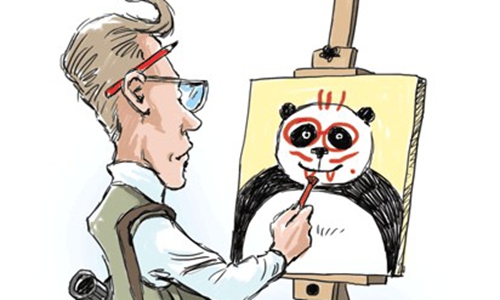West's sophomoric insults, supremacist thinking hurt the world
By Robert Walker Source: Global Times Published: 2020/7/29 16:10:23

Illustration: Liu Rui/GT
To a casual reader of Western news media in China, it would seem that the country is in the midst of an unprecedented diplomatic offensive.
"China's 'Wolf Warrior' Diplomacy Prompts International Backlash," breathlessly declared VOA News earlier this year in an article describing China's defending of its coronavirus lockdown. The term 'wolf warrior' is one given to some ostensibly aggressive Chinese diplomats named after a popular series of Chinese action movies.
The New York Times ran a headline in May reading: "Global Backlash Builds Against China Over Coronavirus," once again deriding China's handling of the pandemic and its alleged refusal to admit to mistakes.
So what actions exactly on China's part have constituted such derision and condemnation?
As far as most mainstream Western media outlets are concerned, China's active and vocal defense of its policies constitute not only a valid and legitimate political position, but rather an example of China's belligerent activities.
The Globe & Mail, Canada's most influential daily newspaper, recently described China's foreign policy as exhibiting "thuggish behavior" as a result of its "assertive and ruthless diplomacy." This cited a 2016 press conference between Wang Yi, China's foreign minister, and Canada's then-foreign minister, Stephane Dion, where Wang vocally critiqued a reporter's question about human rights in China.
And if there were no other perspectives but these opinion page editorials, one could be tempted to believe that yes, in fact, the rhetorical flourishes of China's diplomats represents a new and aggressive tactic. However, when it comes to harsh words and belligerent verbiage, China is still in the little leagues.
Compared with Mike Pompeo, the US Secretary of State, China's diplomats are hardly wolf warriors.
"We opened our arms to Chinese citizens, only to see the Chinese Communist Party exploit our free and open society. China sent propagandists into our press conferences, our research centers, our high-schools, our colleges, and even into our PTA meetings," Pompeo said in a speech last week in California, even going so far as to make the spurious claim that, "China ripped off our prized intellectual property and trade secrets."
But how do Western media outlets report on Pompeo's open and vicious attacks, not just on China's alleged unfair economic practices, but on its foundational governing principles?
According to Politico.com, a leading America political news website: "Pompeo: US engagement with China has failed."
"Pompeo urges more assertive approach to 'Frankenstein' China," heads a Reuters news story covering Pompeo's speech last week. And according to VOA News: "Longtime Engagement with China No Longer Working, Pompeo Says."
This double standard on the part of most Western media news outlets represents an outdated mode of seeing the world, where the US is the leader of the international order, and thus its policies represent stability, whereas should China deign to defend its actions against critique, it is desperate, unpredictable and aggressive.
And when one evaluates deeper the news coverage of the US-China rift, the double standards become even more apparent. China is not only maligned as an untrustworthy actor, it is infantilized.
In June, Bloomberg.com reported on US sanctions against Chinese officials due to its Hong Kong policy, and an opinion writer described the coming punitive measures soon to befall China: "There are good reasons to assume that further punishment of China is coming."
The Wall Street Journal reported in July which policies the US was using to "punish" China over Hong Kong.
Punishment is what a parent does to a misbehaving child, or a teacher to an inattentive student, not what a member of the international community does to a peer.
But clearly, punishment is not a sloppy choice of words for these media outlets, but appears to be done purposefully. For far too many Western media news outlets, the US, or the European Union, or in fact any Western government, speak with authority and legitimacy, while China is a petulant child in need of discipline.
When tensions between two superpowers are at their highest levels in decades, cooler heads and long-term thinking is what is most needed to take a step back from the precipice, not sophomoric insults, name-calling and an orientalist and supremacist mode of thinking. And while cooler heads may not be found in the White House, or in many Western capitals at the moment, the tragedy is that they are conspicuously missing from many Western newsrooms as well.
The author is an expert in international branding strategy, with a particular area of interest in China's image in the Western world.opinion@globaltimes.com.cn
RELATED ARTICLES:
Posted in: VIEWPOINT